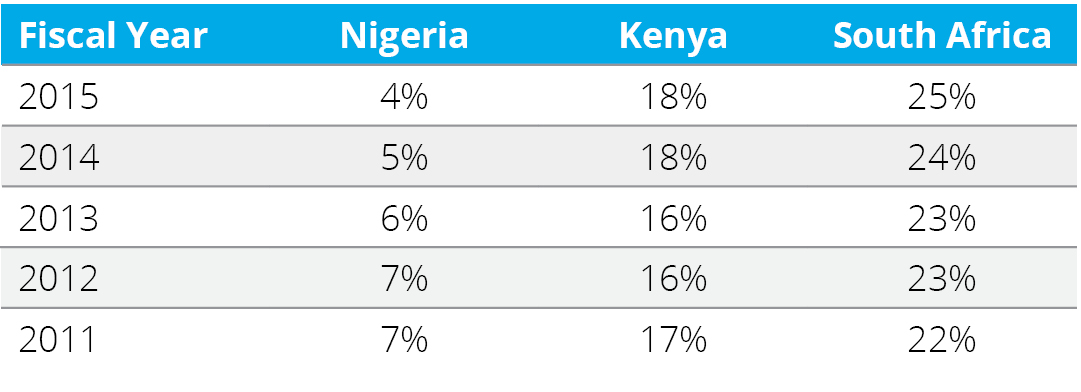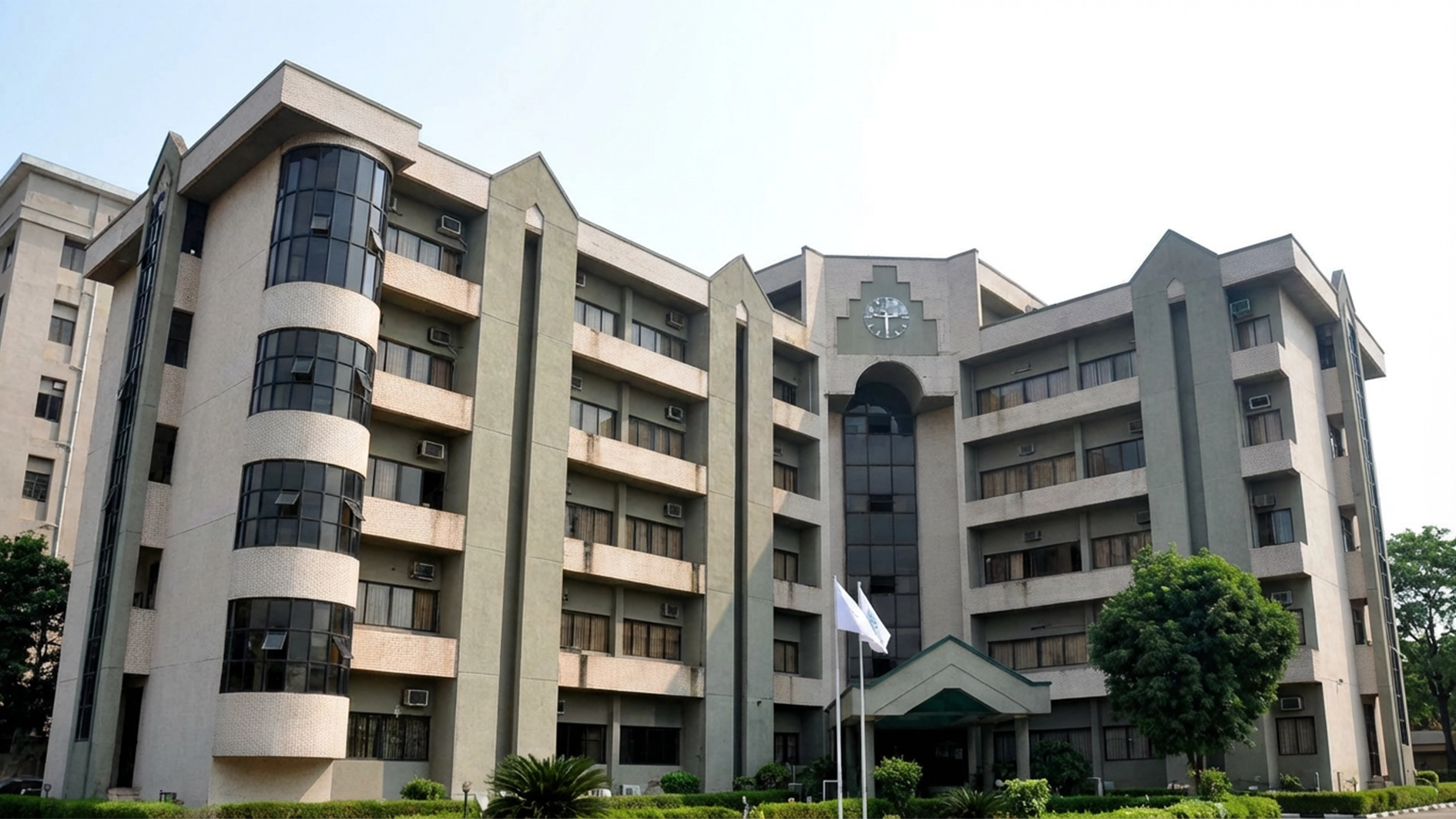The importance of taxation to a nation’s economic wealth and development cannot be overemphasised. However, the achievement of this goal is often undermined by tax evasion and deliberate attempts by multinationals to shift profits from one jurisdiction to another, amongst others.
Over the years, Nigeria has attempted to use taxation as a compulsory tool for the generation of revenue needed to meet its recurrent and capital requirements; however, there is no evidence that this has yielded the desired results.
The analysis below shows a five (5) year comparison of revenue generated from taxes as a percentage of total Gross Domestic Product (GDP) across three jurisdictions in Africa.
 * Source1
* Source1
From the above analysis, Nigeria has the lowest tax to GDP ratio in comparison with the other two countries. This may be attributed to factors such as; lack of expansion of the tax net, partial enforcement of compliance, bureaucratic tax procedures, lack of transparency and accountability. These factors are in no way strange to the government and tax authorities as some efforts have been made over the years to curb them, expand the tax net and increase tax collection. However, the key question is whether these initiatives have been well/fully implemented by the government and tax authorities to yield the desired results.
Due to the present economic recession in Nigeria, revenue allocation from the federation account to state governments has declined sharply by 35% between 2015 and 2016. Many state governments are faced with huge budget deficits as they struggle to meet their obligations and service debts that have accumulated over the years. Thus, the need for the federal, state and local governments to generate adequate revenue from internal sources has become a matter of urgency and importance.
Usually, governments turn to taxes by either increasing the tax rates or creating new taxes in order to boost revenue. However, the foregoing would be sub-optimal considering the economic recession being faced by the country. Each of the options will only increase the financial burden on an already impoverished populace, serve as a deterrent to potential investors and consequently impede recovery of the economy.
Consequently, there is a need to revisit some of the other awesome initiatives which had been put forward by the government or tax authorities in the past and examine if more can be done to achieve the desired objectives.
Implementation of the Integrated Tax Administration System (ITAS)
In a bid to ease the administration and collection of tax in Nigeria, Federal Inland Revenue Service (FIRS) has long set out to implement the ITAS. However, after over five years of the initiation of the plan, the ITAS is still nothing but a dream yet to be realised as the manual procedures of tax filing remains the status quo.
The proposed ITAS is meant to allow taxpayers file tax returns and relevant documents, process tax clearance certificates, remit tax and obtain receipts, update tax information, check the tax identification number (TIN) of vendors, utilise withholding tax credits, amongst other things, electronically. No doubt the implementation of ITAS will eliminate a lot of inefficiencies, such as protracted tax audit processes, tax leakages due to bribery and corruption etc., in the current manual regime of tax administration and increase tax collection. But one would wonder what is delaying the full implementation of the ITAS by FIRS. Could this delay be as a result of the focus of the tax authorities on short-term measures of increasing tax revenue such as raising baseless tax assessments on taxpayers or inadequate IT infrastructure?
In 2015, FIRS launched the electronic tax pay solution, a self-service FIRS channel available on all commercial banks internet banking platforms. Taxpayers were required to log into any bank’s internet banking platform, and click the FIRS link to pay their and or submit necessary documents. However, most taxpayers still pay their tax manually.
Government and the Nigerian tax authorities, therefore, need to learn from other countries around the world such as South Africa, Spain, Costa Rica, India, amongst others, that have since implemented electronic tax systems which have simplified the administration and collection of tax. All barriers preventing the full implementation of ITAS should be identified and addressed immediately. The sooner the ITAS becomes effective, the better it is for taxpayers and the Nigerian tax system.
Enforcement of compliance with tax obligations
One of the reasons for the low tax revenue to GDP ratio is the fact that the tax revenue agencies do not fully enforce the powers granted to them within the ambits of the law. As such, they rarely scrutinise defaulting taxpayers especially those that are supposedly labelled as “untouchable”.
Although, a couple of years back, the tax authorities took action by apprehending top management staff of some companies who have defaulted in paying taxes due. They also ordered out the staff of the defaulting companies and shut down their offices. These actions served as a deterrent to other taxpayers and encouraged voluntary compliance. However, few years down the line, there has been a negative change in the attitude of the tax authorities to enforcing compliance, especially in the areas of recovery of taxes, prompt rendition of tax returns and payment of tax assessed.
One would expect that “violent compliance enforcement actions” that was applied a couple of years back will be embraced by successive managements of the tax agencies. However, it appears this is not the case.
It is, therefore, imperative for the government and tax authorities to revisit their approach to enforcing compliance and discouraging tax evasion given the dire need to surge dwindling revenue through taxation. The tax officials need a complete attitudinal change of the perception that some taxpayers are “untouchable” by progressively implementing measures that make tax evasion unattractive. This may include strict enforcement of the existing provisions of the law on the imposition of penalties. It may also involve amending the tax laws to ensure that certain insufficient punitive penalties are removed and replaced by more punitive ones.
The above are just a few of the many initiatives which the government at all levels may utilise to achieve the desired economic transformation. This will however not come easily until the government institutionalises the focus on revenue generation through taxes as a primary option. We are aware that this issue has been addressed in the recently released revised National Tax Policy. Therefore, it is expected that taxation would be a major source of revenue to drive the country’s economic growth and development in the near future where the right approach towards implementing relevant initiatives is adopted.
Notes:
- Federal Inland Revenue Service tax revenue statistics
“The institute of Certified Public Accountants of Kenya fiscal analysis 2010 to 2015”
“2014 tax statistics a joint publication between National treasury and South Africa Revenue Service”
https://nigeria.opendataforafrica.org/IMFWEO2016Oct/imf-world-economic-outlook-weo-october-2016 - National Bureau of Statistics






